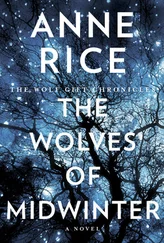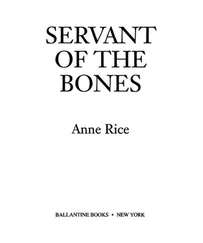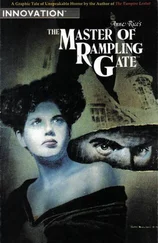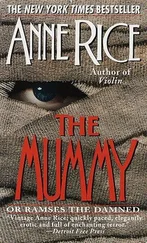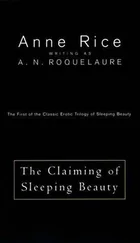Anne Rice - The Vampire Armand
Здесь есть возможность читать онлайн «Anne Rice - The Vampire Armand» весь текст электронной книги совершенно бесплатно (целиком полную версию без сокращений). В некоторых случаях можно слушать аудио, скачать через торрент в формате fb2 и присутствует краткое содержание. Жанр: Ужасы и Мистика, на английском языке. Описание произведения, (предисловие) а так же отзывы посетителей доступны на портале библиотеки ЛибКат.
- Название:The Vampire Armand
- Автор:
- Жанр:
- Год:неизвестен
- ISBN:нет данных
- Рейтинг книги:4 / 5. Голосов: 1
-
Избранное:Добавить в избранное
- Отзывы:
-
Ваша оценка:
- 80
- 1
- 2
- 3
- 4
- 5
The Vampire Armand: краткое содержание, описание и аннотация
Предлагаем к чтению аннотацию, описание, краткое содержание или предисловие (зависит от того, что написал сам автор книги «The Vampire Armand»). Если вы не нашли необходимую информацию о книге — напишите в комментариях, мы постараемся отыскать её.
The Vampire Armand — читать онлайн бесплатно полную книгу (весь текст) целиком
Ниже представлен текст книги, разбитый по страницам. Система сохранения места последней прочитанной страницы, позволяет с удобством читать онлайн бесплатно книгу «The Vampire Armand», без необходимости каждый раз заново искать на чём Вы остановились. Поставьте закладку, и сможете в любой момент перейти на страницу, на которой закончили чтение.
Интервал:
Закладка:
This world was one of spacious rooms, decorated walls, generous fragrant light and a regular parade of high fashion, to which I grew accustomed completely, never seeing much of the pain and misery of the poor of the city at all. Even the books I read reflected this new realm in which I had been so securely fixed that nothing could take me back to the world of confusion and suffering that had gone before.
I learned to play little songs on the Virginal. I learned to strum the lute and to sing in a soft voice, though I would only sing sad songs. My Master loved these songs.
We made a choir now and then, all the boys together, and presented the Master with our own compositions and sometimes our own dances as well.
In the hot afternoon, we played cards when we were supposed to be napping. Riccardo and I slipped out to gamble in taverns. We drank too much once or twice. The Master knew it and put a stop to it at once. He was particularly horrified that I'd fallen drunk into the Grand Canal, necessitating a clumsy and hysterical rescue. I could have sworn he went pale at the account, that I saw the color dance back from his whitening cheeks.
He whipped Riccardo for it. I was full of shame. Riccardo took it like a soldier without cries or comment, standing still at a large fireplace in the library, his back turned to receive the blows on his legs. Afterwards, he knelt and kissed the Master's ring. I vowed I'd never get drunk again.
I got drunk the next day, but I had the sense to stagger into Bianca's house and climb under her bed, where I could fall asleep without risk. Before midnight the Master pulled me out. I thought, Now I'll get it. But he only put me to bed, where I fell asleep before I could apologize. When I woke once it was to see him at his writing desk, writing as swiftly as he could paint, in some great book which he always managed to hide before he left the house.
When others did sleep, including Riccardo, during the worst afternoons of summer, I ventured out and hired a gondola. I lay on my back in it staring skyward, as we floated down the canal and to the more turbulent breast of the gulf. I closed my eyes as we made our way back so that I might hear the smallest cries from the quiet siesta-time buildings, the lap of the rank waters on rotting foundations, the cry of seagulls overhead. I didn't mind the gnats or the smell of the canals.
One afternoon I didn't go home for work or lessons. I wandered into a tavern to listen to musicians and singers, and another time happened upon an open drama on a trestle stage in a square before a church. No one was angry with me for my comings and goings. Nothing was reported.
There were no tests of my learning or anyone else's.
Sometimes I slept all day, or until I was curious. It was an extreme pleasure to wake up and find the Master at work, either in the studio, walking up and down the scaffolding as he painted his larger canvas, or just near me, at his table in the bedroom, writing away.
There was always food everywhere, glistening bunches of grapes, and ripe melons cut open for us, and delicious fine-grained bread with the freshest oil. I ate black olives, slices of pale soft cheese and fresh leeks from the roof garden. The milk came up cool in the silver pitchers.
The Master ate nothing. All knew this. The Master was always gone by day. The Master was never spoken of without reverence. The Master could read a boy's soul. The Master knew good from evil, and he knew deceit. The boys were good boys. There was some hushed mention now and then of bad boys who had been banished from the house almost at once. But no one ever spoke even in a trivial way about the Master. No one spoke about the fact that I slept in the Master's bed.
At noon each day, we dined together formally on roasted fowl, tender lamb, thick juicy slabs of beef.
Three and four teachers came at any one time to instruct the various small groups of apprentices. Some worked while others studied.
I could wander from the Latin class to the Greek class. I could leaf through the erotic sonnets and read what I could until Riccardo came to the rescue and drew a circle of laughter around his reading, for which the teachers had to wait.
In this leniency I prospered. I learnt quickly, and could answer all the Master's casual questions, offering thoughtful questions of my own.
The Master painted four out of the seven nights a week, and usually from after midnight until his disappearance at dawn. Nothing interrupted him on these nights.
He climbed the scaffold with amazing ease, rather like a great white monkey, and, letting his scarlet cloak drop carelessly, he snatched up the brush from the boy who held it for him and painted in such a fury that the paint splattered on all of us as we watched aghast. Under his genius whole landscapes came to life within hours; gatherings of people were drawn with the greatest detail.
He hummed aloud as he worked; he announced the names of the great writers or heroes as he painted their portraits from his memory or his imagination. He drew our attention to his colors, the lines he chose, the tricks with perspective that plunged his groupings of palpable and enthusiastic subjects into real gardens, rooms, palaces, halls.
Only the fill-in work was left to the boys to do by morning-the coloring of drapery, the tinting of wings, the broad spaces of flesh to which the Master would come again to add the modeling while the oily paint was still mobile, the shining flooring of sometime palaces which after his final touches looked like real marble receding beneath the flushed chubby feet of his philosophers and saints.
The work drew us naturally, spontaneously. There were dozens of unfinished canvases and walls within the palazzo, all so lifelike they seemed portals to another world.
Gaetano, one of the youngest of us, was the most gifted. But any of the boys, except me, could match the apprentice painters of any man's workshop, even the boys of Bellini.
Sometimes there was a receiving day. Bianca was then jubilant as she would receive for the Master, and came with her servants to be lady of the house. Men and women from the finest houses in Venice came to view the Master's paintings. People were astonished at his powers. Only from listening to them on these days did I realize my Master sold almost nothing, but filled his palazzo with his own work, and that he had his own versions of most famous subjects, from the school of Aristotle to the Crucifixion of Christ. Christ. This was the curly-haired, ruddy, muscular and human-looking Christ, their Christ. The Christ who was like Cupid or Zeus.
I didn't mind that I couldn't paint as well as Riccardo and the others, that I was half the time content to hold the pots for them, to wash the brushes, to wipe clean the mistakes that had to be corrected. I did not want to paint. I did not want to. I could feel my hands cramp at the thought of it, and there would come a sickness in my belly when I thought of it.
I preferred the conversation, the jokes, the speculation as to why our fabulous Master took no commissions, though letters came to him daily inviting him to compete for this or that mural to be painted in the Ducal Palace or in one or another of the thousand churches of the isle.
I watched the color spreading out by the hour. I breathed in the fragrance of varnishes, the pigments, the oils.
Now and then a stuporous anger overcame me, but not at my lack of skill.
Something else tormented me, something to do with the humid, tempestuous postures of the painted figures, with their glistening pink cheeks and the boiling sweep of cloudy sky behind them, or the fleecy branches of the dark trees.
It seemed madness, this, this unbridled depiction of nature. My head hurting, I walked alone and briskly along the quays until I found an old church, and a gilded altar with stiff, narrow-eyed saints, dark and drawn and rigid: the legacy of Byzantium, as I had seen it in San Marco on my first day. My soul hurt and hurt and hurt as I gazed wor-shipfully at these old proprieties. I cursed when my new friends found me. I knelt, stubborn, refusing to show that I knew they were there. I covered my ears to shut out the laughter of my new friends. How could they laugh in the hollow of the church where the tortured Christ bled tears like black beetles leaping from His fading hands and feet?
Читать дальшеИнтервал:
Закладка:
Похожие книги на «The Vampire Armand»
Представляем Вашему вниманию похожие книги на «The Vampire Armand» списком для выбора. Мы отобрали схожую по названию и смыслу литературу в надежде предоставить читателям больше вариантов отыскать новые, интересные, ещё непрочитанные произведения.
Обсуждение, отзывы о книге «The Vampire Armand» и просто собственные мнения читателей. Оставьте ваши комментарии, напишите, что Вы думаете о произведении, его смысле или главных героях. Укажите что конкретно понравилось, а что нет, и почему Вы так считаете.

